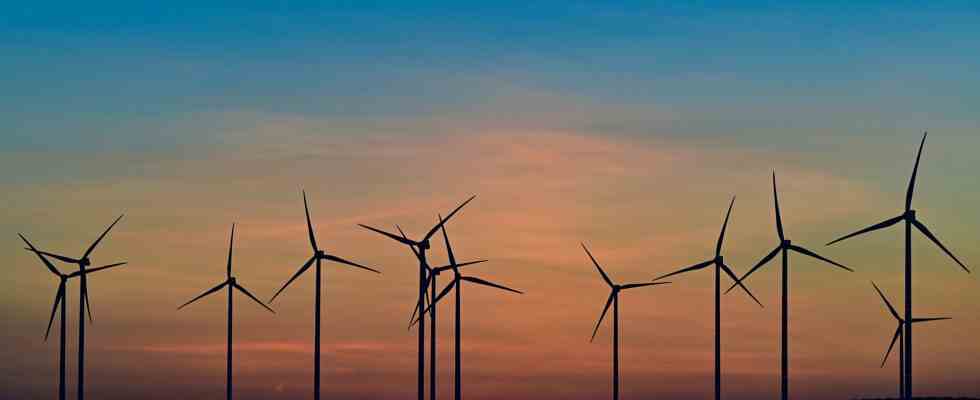Status: 06.04.2022 18:24
More wind and solar power – that should happen faster in Germany, also to become more independent in terms of energy. The “Easter package” should help. But not everyone is already on a green branch.
Robert Habeck is very proud, he speaks of an “Easter package”: around 600 pages, the legislative amendments drawn up by his ministry, the focus of which is the expansion of renewable energies. This includes changes to laws with such beautiful names as: Renewable Energy Sources Act, Offshore Wind Energy Act, Grid Expansion Acceleration Act, Transmission Grid.
All of this sounds technical, but it serves a major goal: on the way to climate neutrality, the power supply in Germany should come almost exclusively from renewable energies as early as 2035 – today the corresponding share is 42 percent.
Habeck’s “Easter package” is intended to put Germany on an independent climate path
Julie Kurz, ARD Berlin, daily news 5:00 p.m., April 6, 2022
However, the legislative package has gained a very current meaning as a result of the Ukraine war, says Habeck. The war shows that energy policy is also geopolitics – after all, the dependence on Russia for energy policy also affects German security interests. The “Easter package” is an answer, because it is about making yourself independent of Russian energy imports and then of fossil energy imports, i.e. coal, oil and gas, in general.
Procedures should become simpler
At the heart of the package are process simplifications for the construction of new wind power and solar plants. “What we are doing,” says Habeck, “is to make the interpretation of the law easier.” A legal term helps here: The use of renewable energies is defined as being in “overriding public interest” and as a service to public safety. This definition means that objections to the construction of solar and wind systems can no longer be raised as easily as before.
Measures to achieve the goal set by the federal government of producing wind power on two percent of the area are not yet part of the “Easter package”. Habeck wants to seek consensus with the federal states, but does not want to avoid conflicts: “If wind power planning is politically prevented in times like these, then that doesn’t fit into the political landscape. And we will stop prevention planning accordingly,” says Habeck , while protecting the legitimate concerns of citizens: “It is clear that you should not sleep next to a wind turbine.”
The economy is drawn to the wind farms
A critical point are distance rules that make it difficult to build new wind turbines – example: the “10H rule in Bavaria”, which stipulates a minimum distance of ten times the height of wind turbines to buildings. Habeck does not say whether he wants to specifically undermine this rule. According to Habeck, there could also be 20H or 30H rules, but the two percent target for the expansion of wind energy must be achieved.
According to the Green Minister, the recent settlement of important companies also shows that the economy relies on the proximity to large wind farms. Many politicians would then understand that the presence of renewable energies represents a competitive or locational advantage for their region.
As for the cost of the “Easter package,” Habeck is covered: it would only cost the taxpayer a little. However, various support measures are to be run through the government’s climate fund, which was recently replenished with 60 billion euros from corona debt. The abolition of the EEG levy on the electricity price from July 1 will also be financed from this pot.
It doesn’t happen overnight
The climate goals, Habeck admits, can only be improved in the medium term. After all, the construction of new wind turbines – as of today – would take four to eight years. In this respect, the “Easter package” with the simplification of procedures is the prerequisite “that we can make better, faster and more comprehensive progress over the next eight years.” Politicians can only provide the framework conditions, in the end the systems have to be approved, built and erected on site. Capacity limits in the trades and delivery bottlenecks are likely to limit rapid expansion.
The FDP wants to make “constructive” improvements
The other parties also welcome the speeding up of the approval procedures. Habeck’s coalition partner, the FDP, has expressed reservations on individual points. The current draft is “still a long way from finding a majority in the Bundestag,” explains Deputy Group Leader Lukas Koehler. The FDP agreed in the cabinet so that no time was wasted unnecessarily: “We don’t want to hold up the procedure, but rather work constructively with our coalition partner to ensure that the law is improved again in parliament.”
One of the points of criticism: The FDP does not believe that the goal of completely converting electricity consumption to renewable energies by 2035 can be achieved. In addition, it was agreed in the coalition to strengthen market-based and innovative instruments in the expansion of renewables instead of introducing new subsidy programs. According to FDP politician Köhler, the final abolition of the EEG levy and the end of the EEG subsidy would also have to be regulated more clearly.
According to Green Minister Habeck, the differences can be bridged. He was sure “that this can be resolved well”. The fact that an agreement was not reached before the cabinet meeting is solely due to the current situation – and in turn to geopolitics.
Minister of Economics Habeck’s Easter package to expand renewable energies
Hans-Joachim Vieweger, ARD Berlin, April 6, 2022 5:16 p.m

